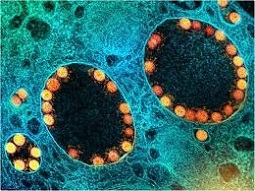BREAKING! Saudi Study Finds Link Between Glucose-6-Phosphate Dehydrogenase (G6PD) Deficiency And Risk For COVID-19 Severity.
COVID-19 News - Glucose-6-Phosphate Dehydrogenase (G6PD) Deficiency May 24, 2023 1 year, 10 months, 3 weeks, 5 days, 14 hours, 15 minutes ago
COVID-19 News: In a groundbreaking study conducted by scientists from major Saudi Arabia tertiary centers, a startling connection between Glucose-6-Phosphate Dehydrogenase (G6PD) deficiency and COVID-19 has been unveiled.

G6PD is a common enzymatic defect affecting over 400 million individuals worldwide and has been associated with various disorders. This genetic disorder is inherited in an X-linked recessive manner, resulting in inefficient or absent expression of the G6PD enzyme.
Recent study findings that have yet to be covered by any
COVID-19 News outlets, suggest that G6PD-deficient cells are more susceptible to infection by human coronaviruses due to their impaired oxidative stress metabolism, potentially increasing the risk of severe COVID-19 outcomes.
The G6PD enzyme's involvement in oxidative stress metabolism suggests that individuals with G6PD deficiency may experience increased viral replication and higher mortality rates when infected with COVID-19.
This retrospective study aimed to explore the effects of COVID-19 on patients with G6PD deficiency and shed light on the potential risk factors associated with this genetic condition. The implications of the study findings could revolutionize our understanding of COVID-19 and pave the way for improved clinical decision-making and patient outcomes.
The Role of G6PD and Its Deficiency
Glucose-6-phosphate dehydrogenase (G6PD) is a critical enzyme involved in the metabolism of glucose through the pentose phosphate pathway (PPP). This pathway serves two essential functions: the synthesis of ribose 5-phosphate for nucleotide and nucleic acid formation, and the production of nicotinamide adenine dinucleotide phosphate (NADPH), a vital reductant responsible for fatty acid and steroid synthesis, as well as maintaining antioxidant activity through the reduction of glutathione.
G6PD deficiency is an inherited X-linked recessive disorder characterized by the inadequate expression of the G6PD enzyme due to genetic mutations. This deficiency has been linked to a range of conditions, including acute hemolytic anemia, neonatal hyperbilirubinemia, and chronic hemolytic anemia.
The Link Between G6PD Deficiency and COVID-19
Previous research has demonstrated a significant association between G6PD deficiency and an increased risk of cardiovascular disease, systolic blood pressure, and other disorders. Among the triggers that can potentially cause acute hemolytic anemia in G6PD-deficient individuals, viral infections stand out as a major factor. Viral infections induce the production of reactive oxygen species (ROS), which can be particularly harmful to G6PD-deficient cells due to their susceptibility to oxidative stress.
In the case of COVID-19, the SARS-CoV-2 virus infects human lung cells, leading to severe pneumonia, acute respiratory distress syndrome (ARDS), and systemic complications. The dysregulated redox environment resulting from G6PD deficiency could exacerbate these pathological processes and contribute to the severity of the disease.
The Study's
Findings
The retrospective study analyzed data from 233 G6PD deficiency patients, 21 G6PD-deficient COVID-19 patients, and 42,856 COVID-19 patients. The results revealed significant differences in hematological and biochemical parameters between the three groups. Laboratory tests such as prothrombin time, fibrinogen, D-dimer, lactate dehydrogenase (LDH), total bilirubin, ferritin, aspartate aminotransferase (AST), alanine aminotransferase (ALT), albumin, creatinine, and blood urea nitrogen exhibited distinct variations among the groups, suggesting that COVID-19 may influence these parameters and that they could serve as indicators for the severity of the disease.
Importantly, the study indicated that individuals with G6PD deficiency may be at higher risk for contracting COVID-19 and experiencing complications associated with the disease.
Furthermore, the study revealed notable demographic trends, such as a higher proportion of males in the G6PD deficiency group and in the G6PD deficiency with COVID-19 group. This observation aligns with previous research highlighting the higher prevalence of G6PD deficiency among males.
Implications and Future Research
While the study acknowledges its limitations, such as the lack of a random selection method for group membership, it compensates for it by employing the Kruskal-Wallis H-test to statistically assess the data. Despite these limitations, the findings of this study have the potential to significantly enhance our understanding of the relationship between COVID-19 and G6PD deficiency, providing valuable insights for clinical decision-making and improving patient outcomes.
The study findings were published in the peer reviewed journal: Viruses.
https://www.mdpi.com/1999-4915/15/6/1224
For the latest
COVID-19 News, keep on logging to Thailand Medical News.
